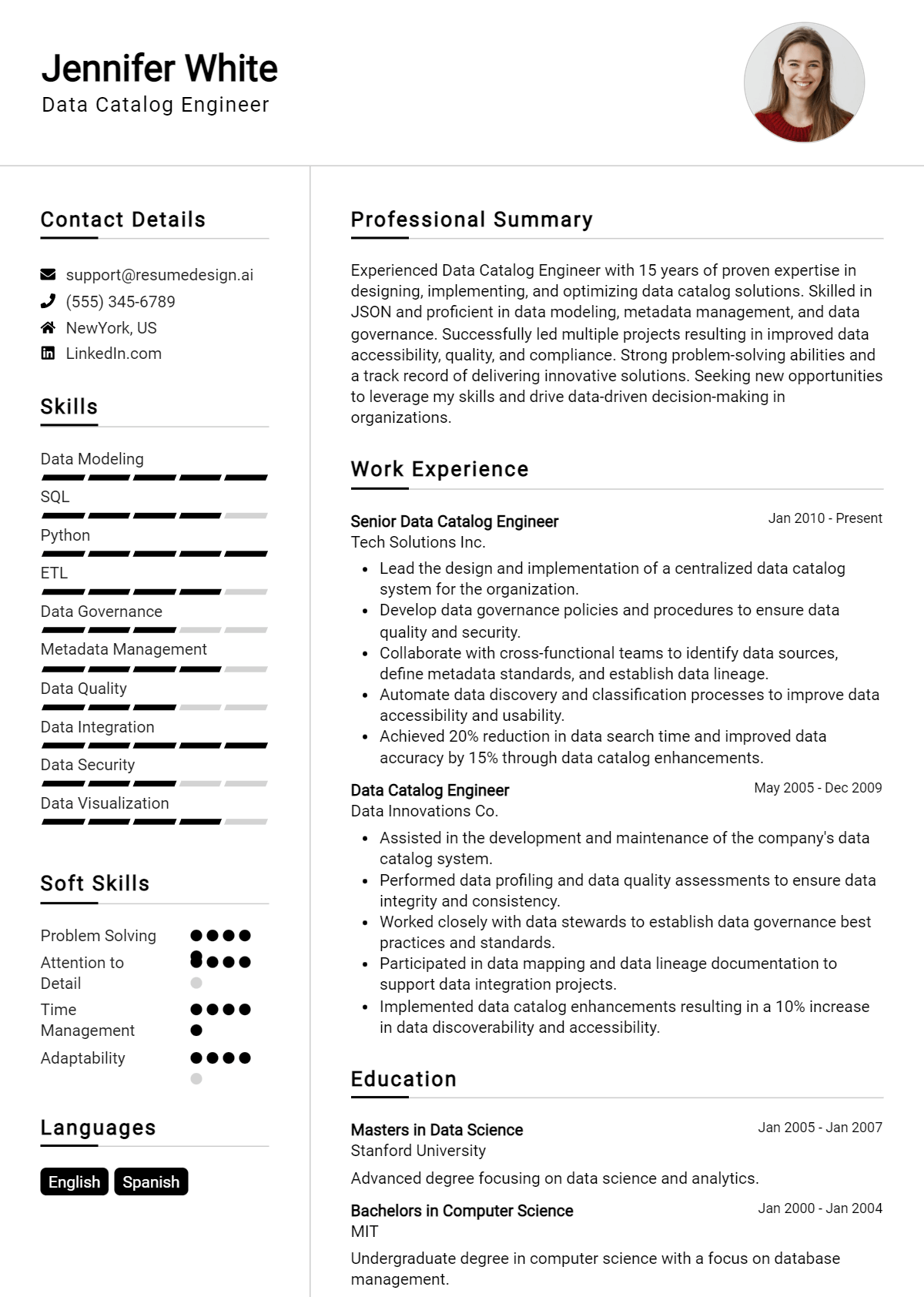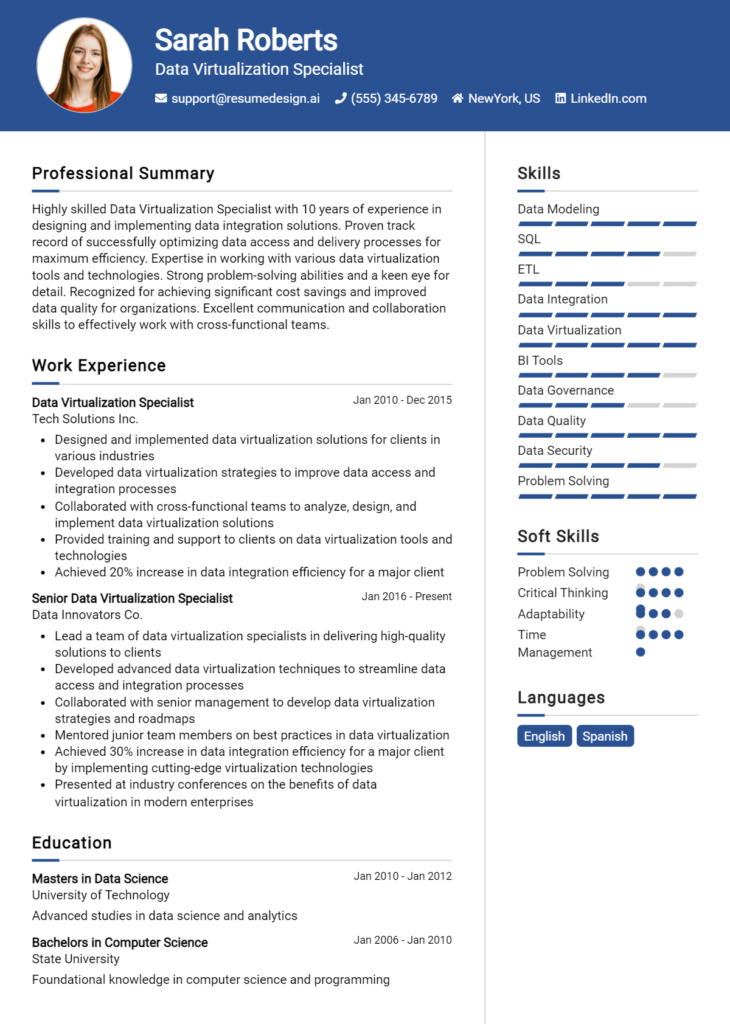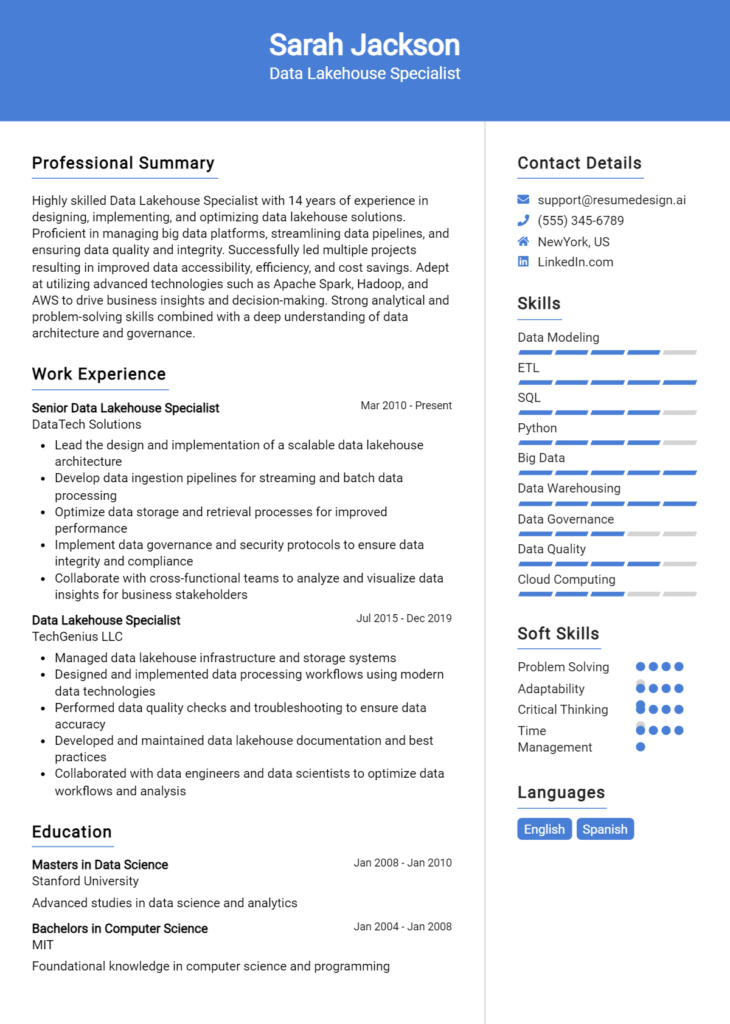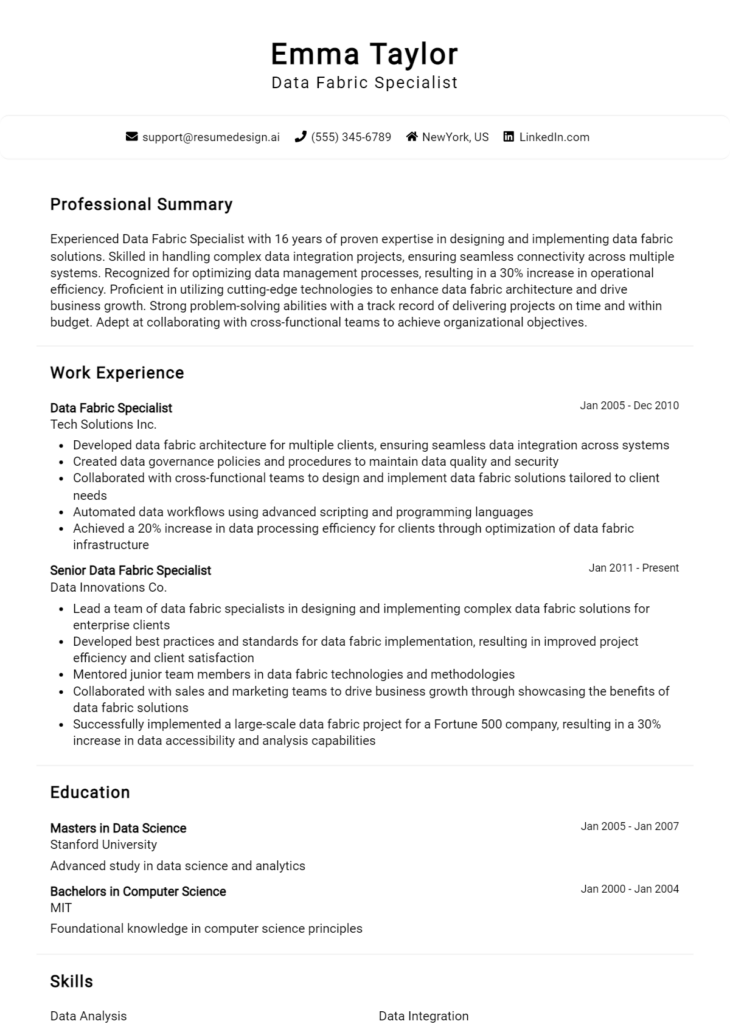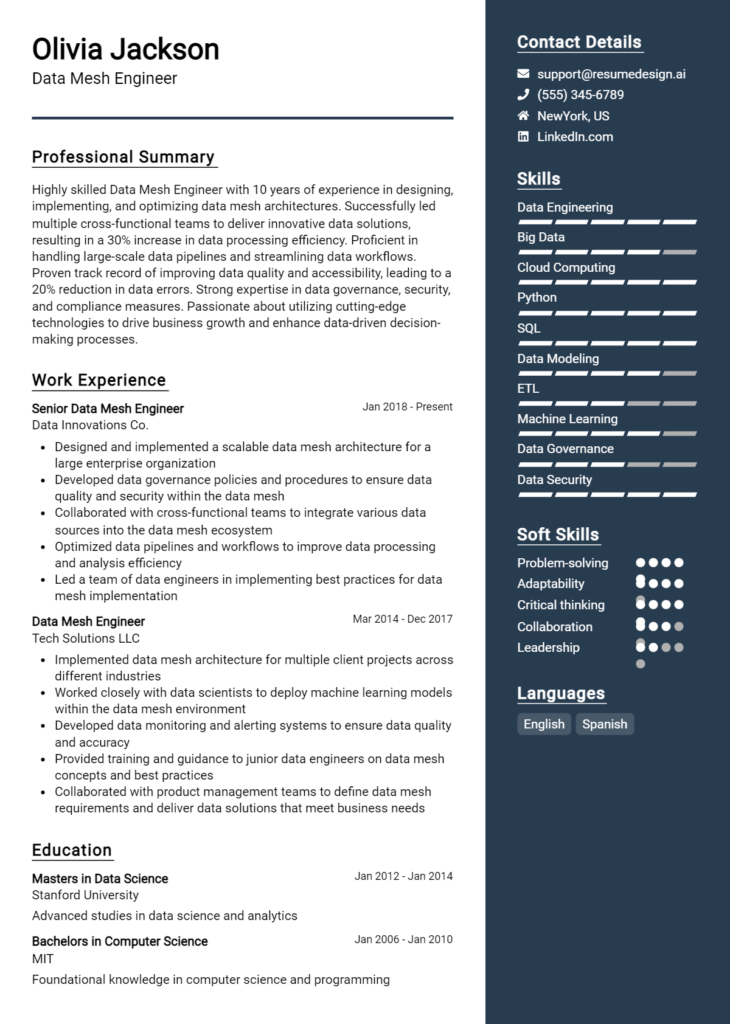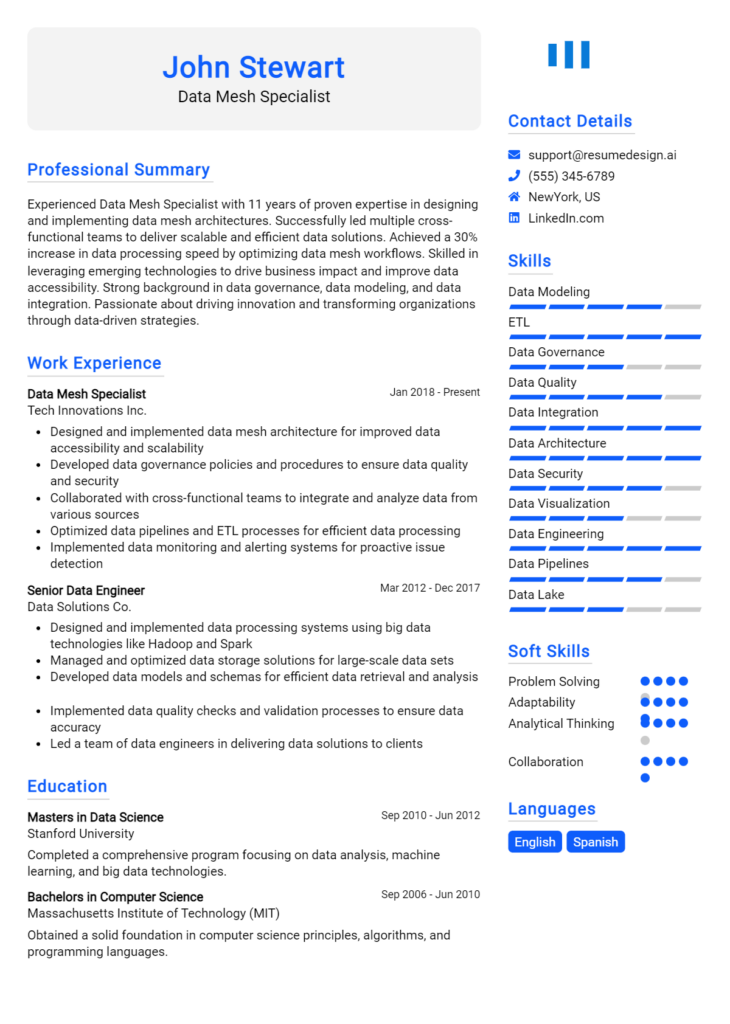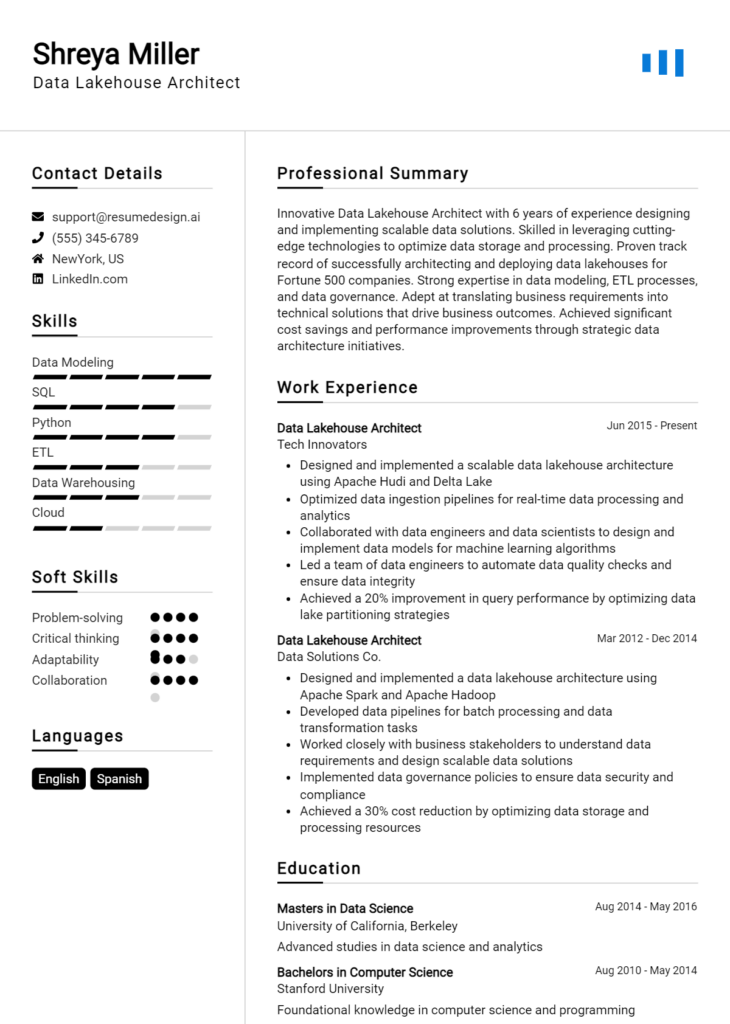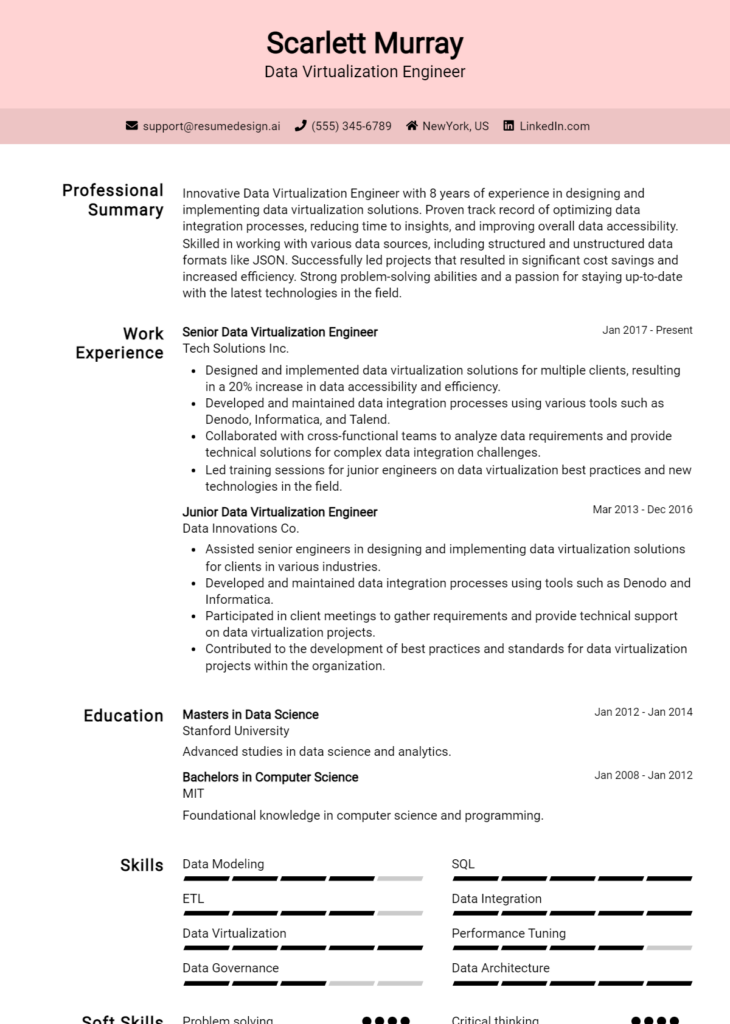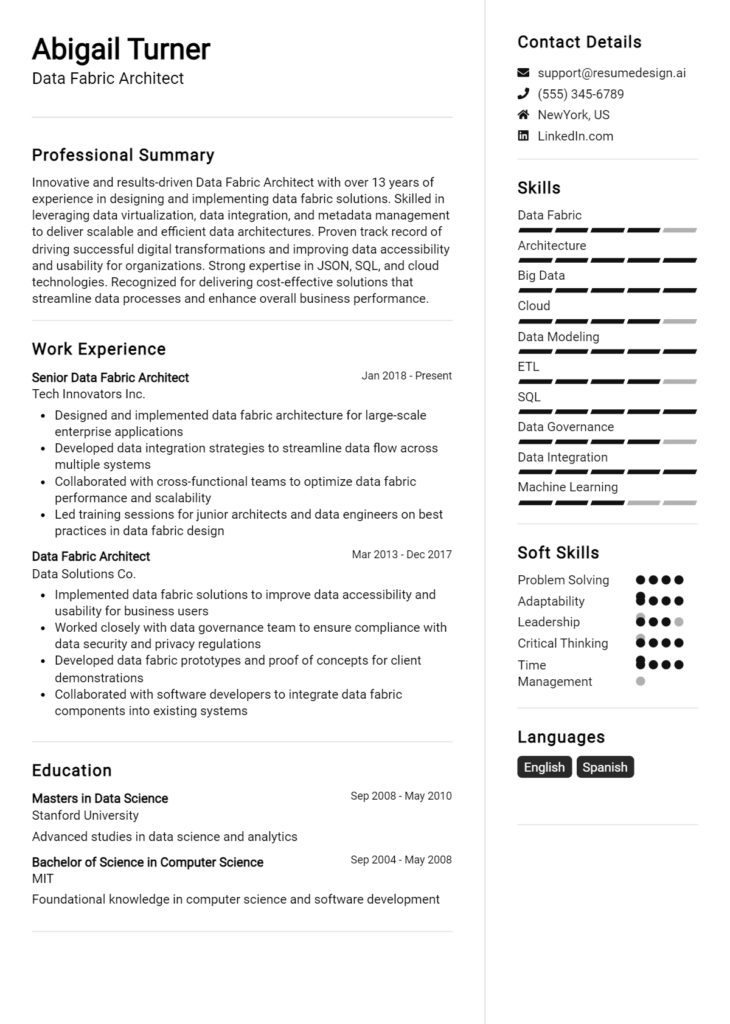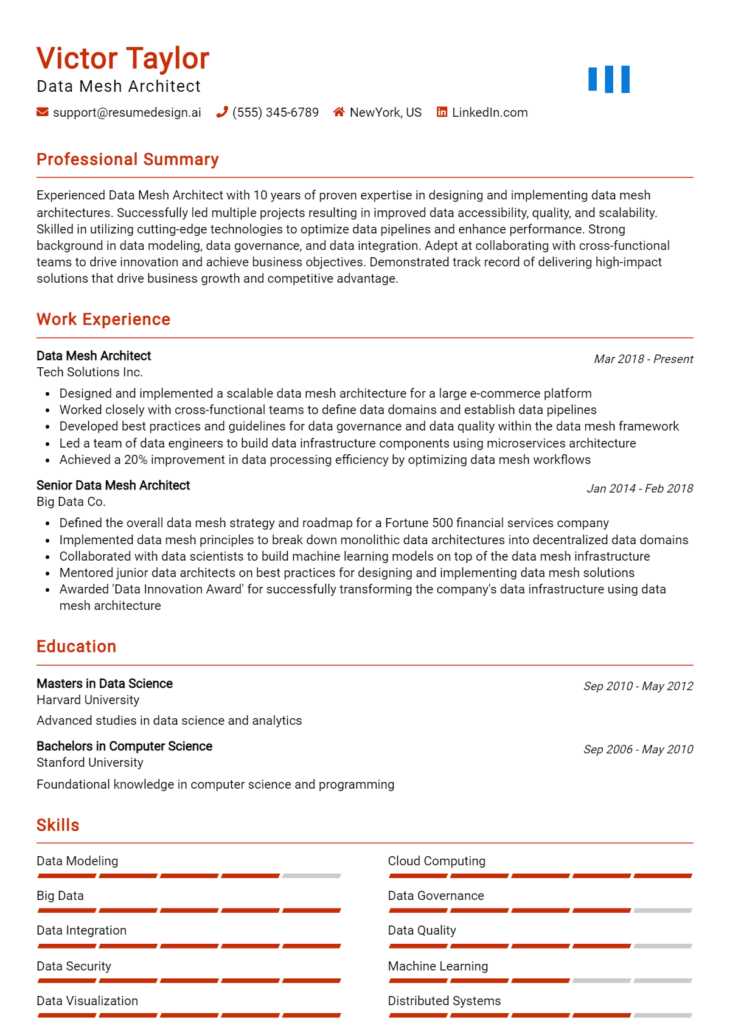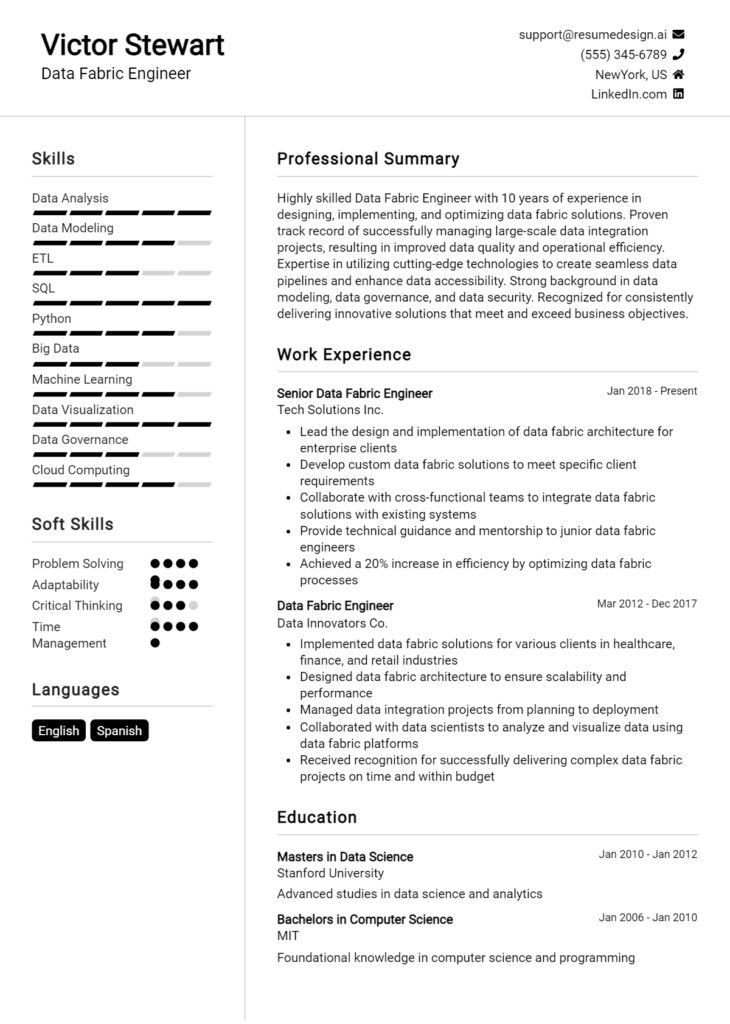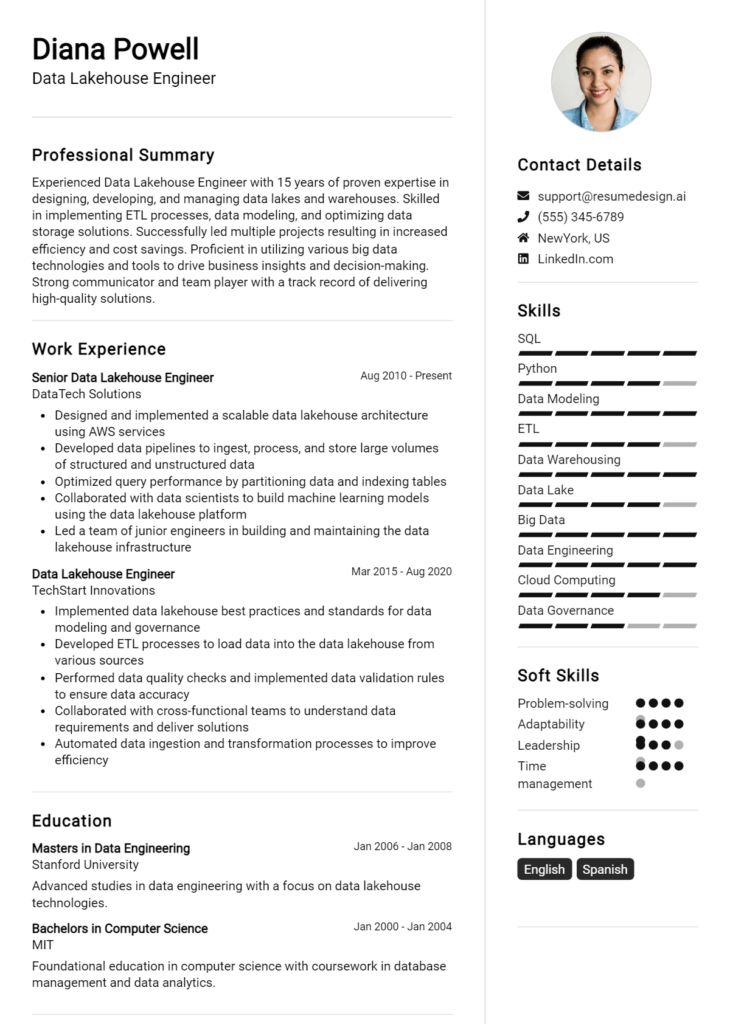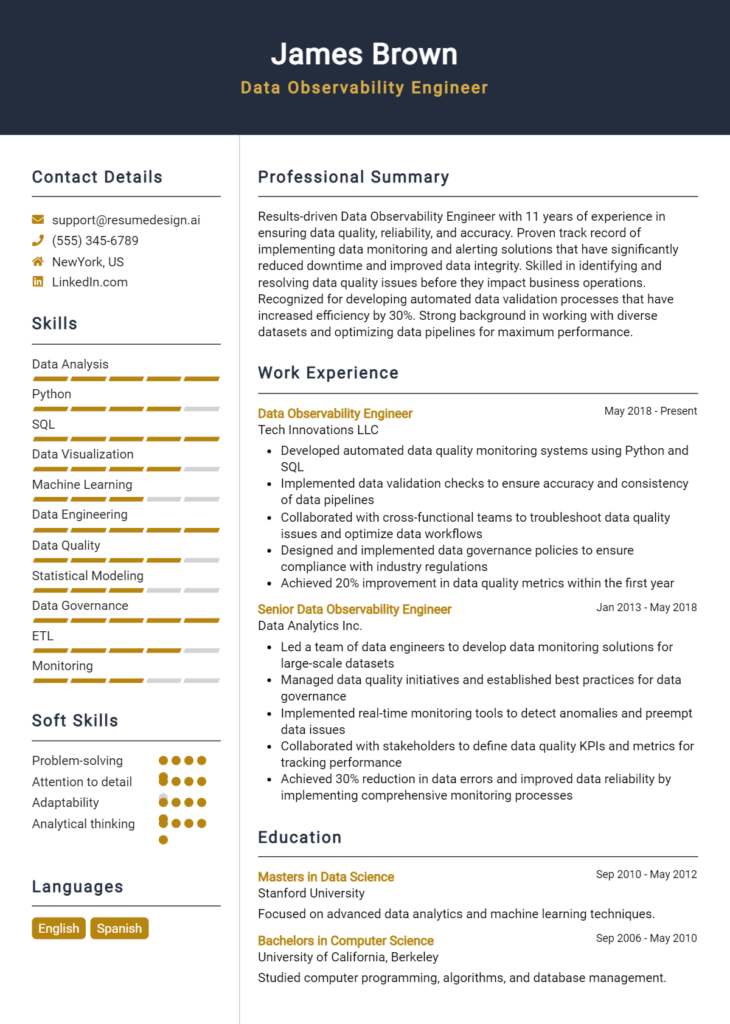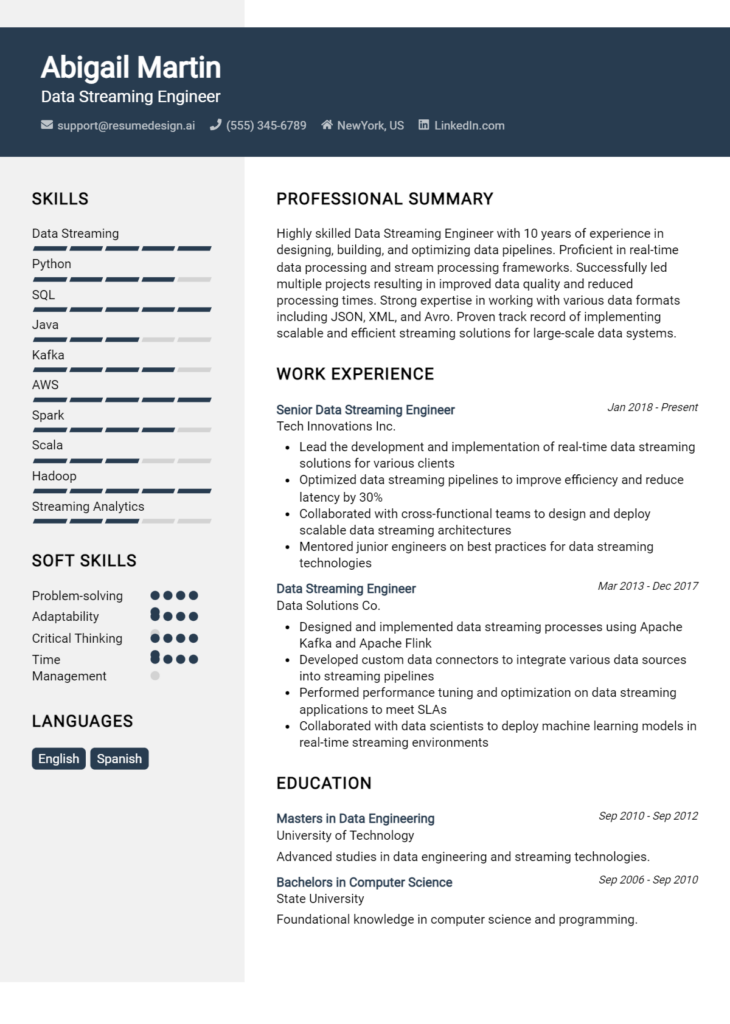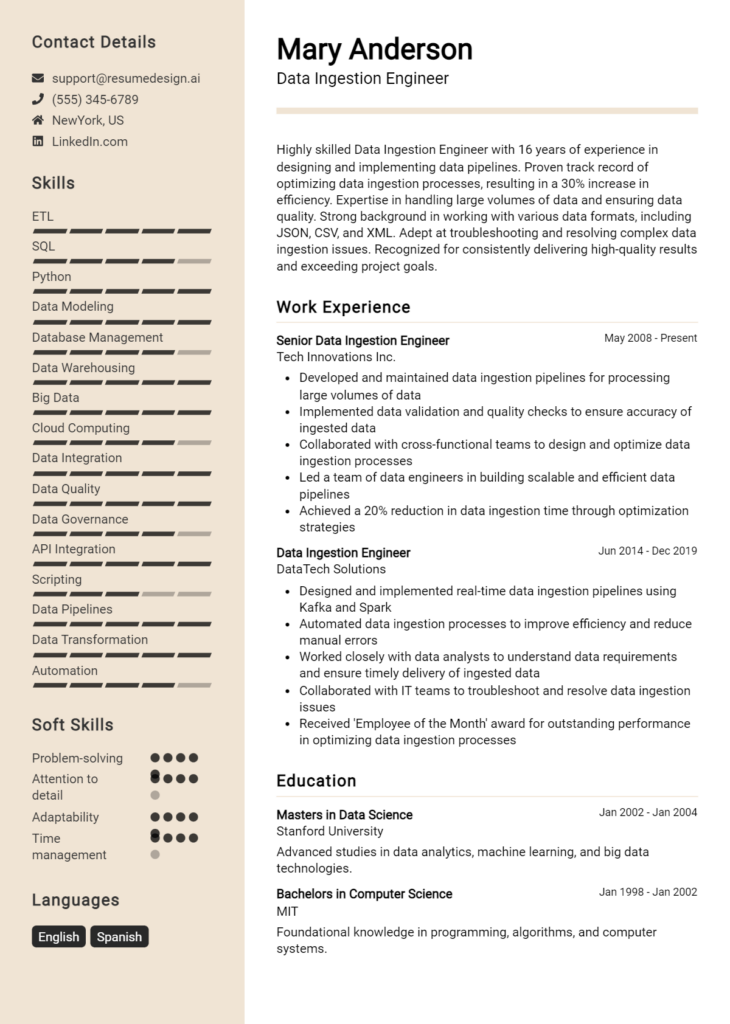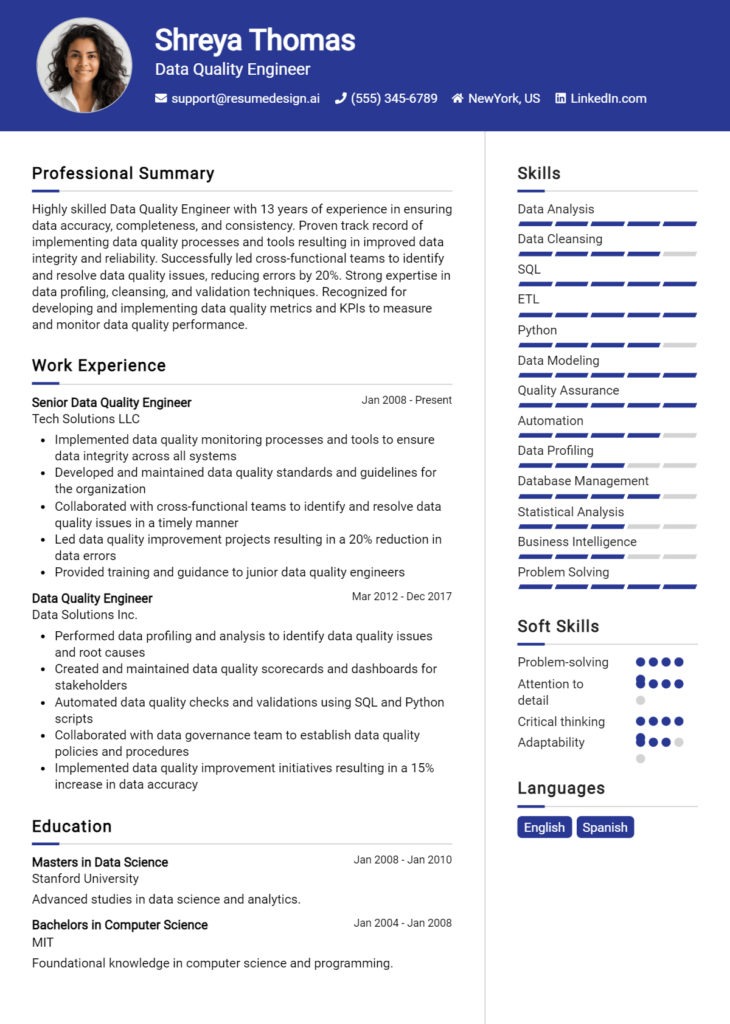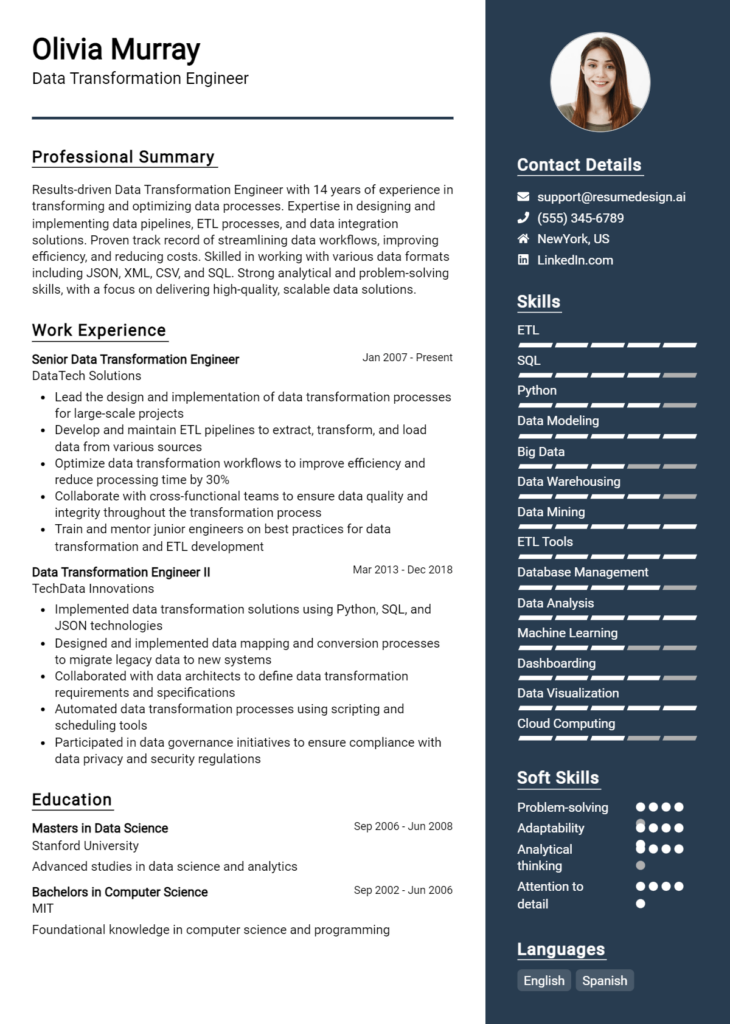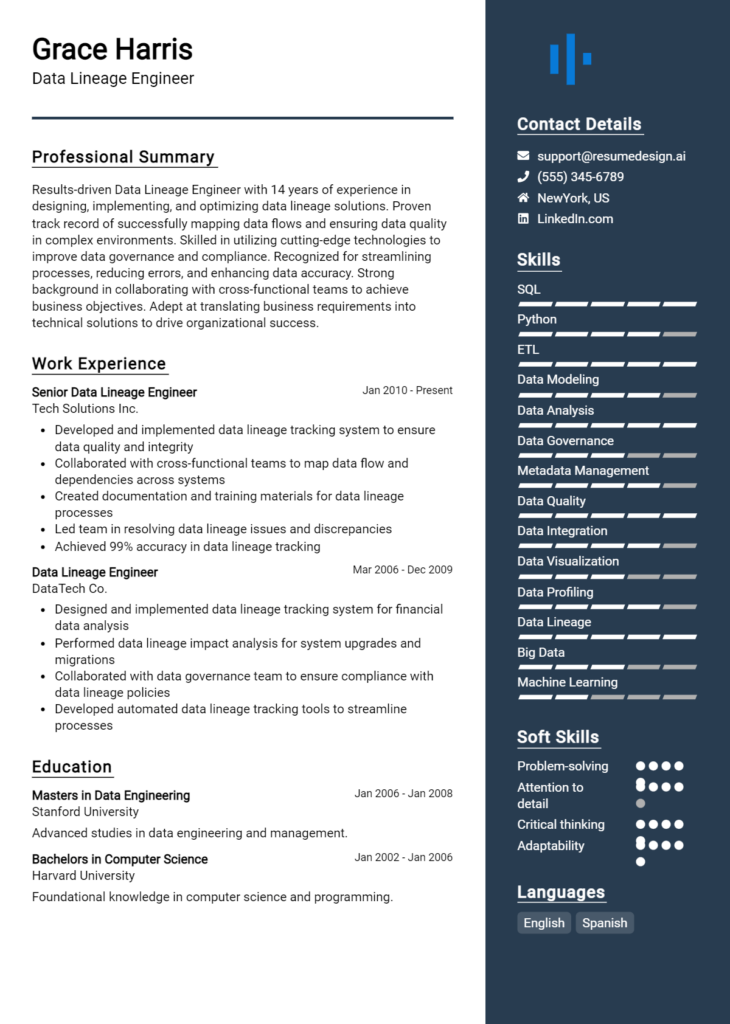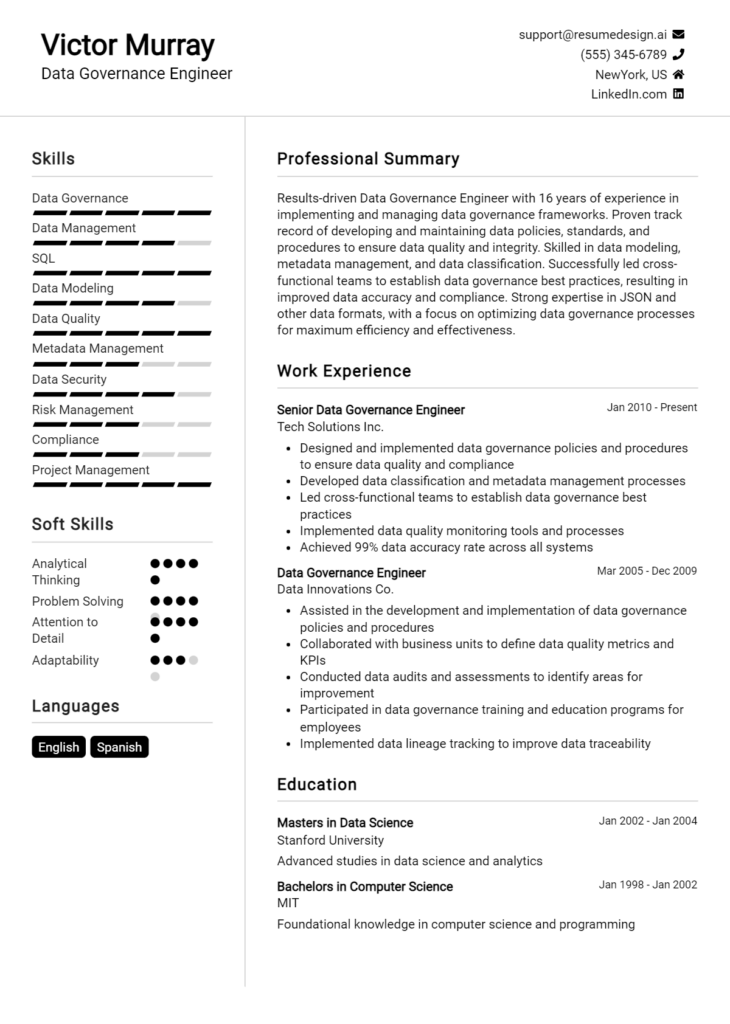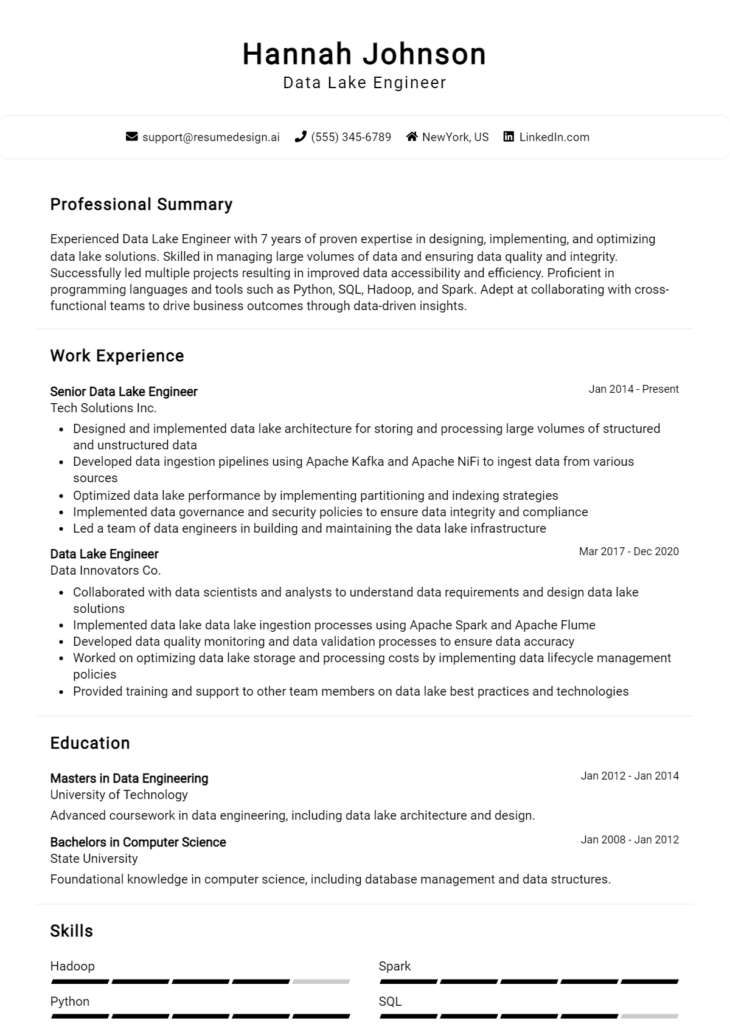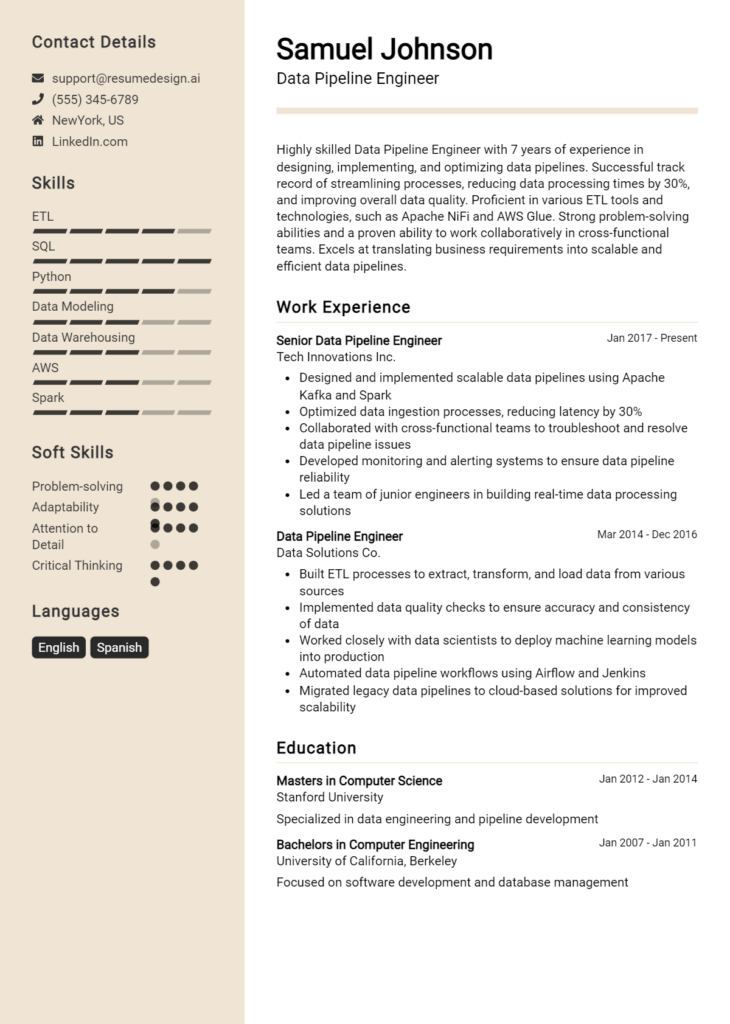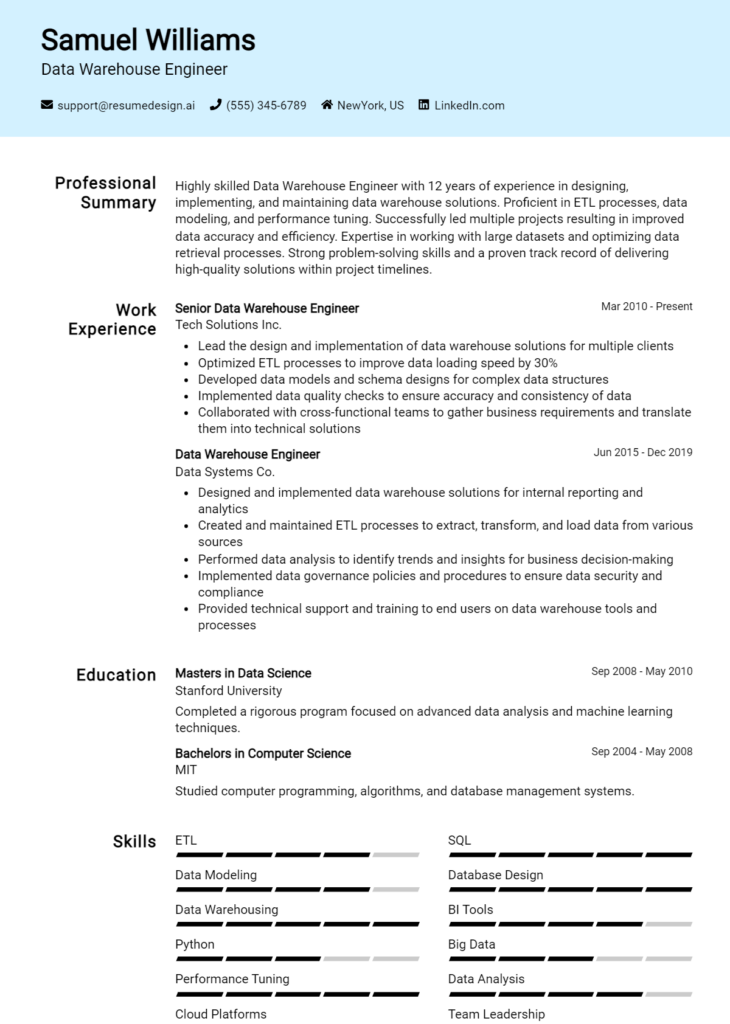Data Catalog Engineer Core Responsibilities
A Data Catalog Engineer plays a crucial role in managing an organization’s data landscape by designing and maintaining a comprehensive data catalog. This position requires technical expertise in data management tools, operational skills for data governance, and problem-solving abilities to address data-related challenges. By bridging departments, the engineer fosters collaboration and enhances data accessibility, ensuring that stakeholders can leverage data efficiently. A well-structured resume highlighting these competencies is essential for demonstrating how this role contributes to achieving organizational goals.
Common Responsibilities Listed on Data Catalog Engineer Resume
- Develop and maintain a centralized data catalog for easy data discovery.
- Collaborate with data stewards and stakeholders across departments.
- Implement data governance policies and best practices.
- Conduct data quality assessments and ensure compliance.
- Facilitate training sessions on data catalog usage and best practices.
- Automate catalog processes for efficiency and accuracy.
- Gather and document metadata from various data sources.
- Support data lineage and impact analysis initiatives.
- Monitor and resolve data catalog issues and user queries.
- Integrate data catalog solutions with existing data infrastructure.
- Stay updated on emerging technologies and trends in data management.
High-Level Resume Tips for Data Catalog Engineer Professionals
In today's competitive job market, a well-crafted resume is crucial for Data Catalog Engineer professionals who aim to make a strong first impression on potential employers. Your resume serves as the initial representation of your skills, experience, and accomplishments, making it essential to articulate your value effectively. As the gateway to securing an interview, it must not only highlight your technical prowess but also showcase your successes in the field. This guide will provide practical and actionable resume tips specifically tailored for Data Catalog Engineer professionals, helping you to stand out in a crowded applicant pool.
Top Resume Tips for Data Catalog Engineer Professionals
- Tailor your resume to the job description by incorporating relevant keywords and phrases that match the specific role you're applying for.
- Highlight your experience with data catalog tools and technologies, such as Apache Atlas, Alation, or Collibra, emphasizing your proficiency.
- Quantify your achievements by including metrics, such as the number of datasets cataloged, time saved through automation, or improvements in data accessibility.
- Showcase your understanding of data governance and data management best practices, as they are critical in the role of a Data Catalog Engineer.
- Include relevant certifications, such as Certified Data Management Professional (CDMP) or specific tool certifications, to enhance your credibility.
- Demonstrate your collaboration skills by mentioning experiences where you worked with cross-functional teams to improve data quality and usability.
- Utilize a clean and professional format that makes your resume easy to read, ensuring that key information stands out.
- Incorporate a summary or objective statement that clearly outlines your career goals and what you bring to the role of Data Catalog Engineer.
- Keep your resume concise, ideally one page for less experienced candidates or two pages for seasoned professionals, ensuring all information is relevant.
- Proofread your resume to eliminate any spelling or grammatical errors, as attention to detail is crucial in data-related roles.
By implementing these tips, you can significantly enhance your chances of landing a job in the Data Catalog Engineer field. A well-structured and tailored resume not only showcases your qualifications but also aligns with the specific needs of employers, positioning you as a strong candidate in a highly specialized area.
Why Resume Headlines & Titles are Important for Data Catalog Engineer
In the competitive landscape of job applications, particularly for specialized roles like Data Catalog Engineer, a well-crafted resume headline or title plays a crucial role in attracting the attention of hiring managers. A strong headline can serve as a powerful first impression, summarizing a candidate's key qualifications in just a few impactful words. It should encapsulate essential skills and experiences relevant to the position, allowing hiring managers to quickly assess the candidate's suitability. By being concise and targeted, a compelling resume title not only highlights the candidate’s expertise but also sets the tone for the rest of the resume, making it easier for potential employers to see the value the candidate brings to their organization.
Best Practices for Crafting Resume Headlines for Data Catalog Engineer
- Keep it concise: Aim for 8-10 words that capture your expertise.
- Be role-specific: Use terminology related to data cataloging and engineering.
- Highlight key skills: Include technical skills or tools relevant to the role.
- Incorporate accomplishments: Mention any significant achievements or contributions.
- Avoid buzzwords: Use clear language rather than generic phrases.
- Tailor for each application: Customize the headline based on the job description.
- Use active language: Start with strong verbs to convey your energy and initiative.
- Showcase certifications: If applicable, include relevant certifications in the headline.
Example Resume Headlines for Data Catalog Engineer
Strong Resume Headlines
"Data Catalog Engineer with 5+ Years in Data Governance and Metadata Management"
"Experienced Data Catalog Specialist: Expertise in Data Lineage and Quality Assurance"
“Innovative Data Catalog Engineer Driven by Data-Driven Solutions and Integration”
“Certified Data Management Professional Focused on Optimizing Data Discovery Processes”
Weak Resume Headlines
“Engineer with Data Experience”
“Seeking a Job in Data”
The strong headlines are effective because they are specific, clearly outlining the candidate’s skills, experience, and potential contributions to the employer. By using relevant terminology and focusing on achievements, these titles immediately convey value and expertise. In contrast, the weak headlines fail to impress due to their vagueness and lack of detail. They do not provide any substantial information about the candidate’s qualifications, leaving hiring managers with little incentive to consider the applicant further. Clear and impactful headlines are essential for standing out in a crowded job market.
Writing an Exceptional Data Catalog Engineer Resume Summary
A resume summary is a crucial component for a Data Catalog Engineer, as it serves as the first impression a hiring manager will have of a candidate. A strong summary quickly captures attention by succinctly showcasing key skills, relevant experience, and notable accomplishments that directly relate to the job role. This brief but impactful introduction should be tailored specifically to the position being applied for, highlighting how the candidate's expertise aligns with the organization's needs and goals.
Best Practices for Writing a Data Catalog Engineer Resume Summary
- Quantify achievements: Use numbers and metrics to illustrate the impact of your work.
- Focus on relevant skills: Highlight technical and soft skills that are directly related to data cataloging.
- Tailor the summary: Customize your summary to align with the specific job description and requirements.
- Be concise: Keep your summary brief, ideally between 2-4 sentences, to maintain the reader's attention.
- Showcase problem-solving abilities: Include examples that demonstrate how you've effectively addressed challenges in previous roles.
- Use action verbs: Start sentences with strong action verbs to convey confidence and proactivity.
- Highlight industry knowledge: Mention familiarity with relevant tools, technologies, and data governance practices.
- Maintain a professional tone: Ensure the language used is formal and reflects your professionalism in the field.
Example Data Catalog Engineer Resume Summaries
Strong Resume Summaries
Detail-oriented Data Catalog Engineer with over 5 years of experience in developing and maintaining comprehensive data catalogs. Successfully implemented a new metadata management system that increased data discoverability by 40%, resulting in a 25% reduction in project turnaround times.
Results-driven Data Catalog Engineer skilled in optimizing data workflows and enhancing data integrity. Led a cross-functional team to create a centralized data repository, improving data accessibility for 200+ users and decreasing data retrieval times by 30%.
Proficient Data Catalog Engineer with a proven track record of leveraging advanced data modeling techniques to streamline data governance processes. Developed and deployed data catalog solutions that improved compliance reporting accuracy by 50% within six months.
Weak Resume Summaries
Data Catalog Engineer with experience in the industry. Looking to apply my skills in a new role.
Experienced professional in data management. I have worked on various projects and am eager to contribute to a team.
The examples provided illustrate the key differences between strong and weak resume summaries. Strong summaries are characterized by their specificity, quantifiable results, and clear relevance to the Data Catalog Engineer role, effectively demonstrating the candidate's value. In contrast, weak summaries lack detail, fail to quantify achievements, and appear generic, making it difficult for hiring managers to assess the candidate's fit for the position.
Work Experience Section for Data Catalog Engineer Resume
The work experience section of a Data Catalog Engineer resume is crucial, as it serves as a powerful testament to a candidate's technical skills, leadership capabilities, and commitment to delivering high-quality products. This section not only highlights specific roles and responsibilities but also showcases how the candidate has effectively managed teams, navigated complex data environments, and contributed to data governance initiatives. By quantifying achievements and aligning the experience with industry standards, candidates can better demonstrate their value to potential employers, making it a key component of a compelling resume.
Best Practices for Data Catalog Engineer Work Experience
- Highlight technical skills relevant to data cataloging, such as metadata management, data governance, and data integration.
- Quantify achievements by using metrics, such as percentage improvements in data retrieval times or reductions in data duplication.
- Demonstrate collaboration by detailing experiences working with cross-functional teams, including data analysts, engineers, and business stakeholders.
- Include specific tools and technologies used, such as data catalog software, ETL tools, and database management systems.
- Focus on results-oriented statements that clearly show the impact of your contributions on projects or processes.
- Tailor your work experience to match the job description, emphasizing relevant experiences that align with the employer’s needs.
- Use action verbs to start each bullet point, showcasing initiative and leadership.
- Keep descriptions concise and focused, ensuring clarity and ease of reading for hiring managers.
Example Work Experiences for Data Catalog Engineer
Strong Experiences
- Led a team of 5 data engineers in implementing a centralized data catalog solution, reducing time spent on data discovery by 40%.
- Developed and maintained metadata management processes that improved data quality, resulting in a 30% decrease in data-related errors.
- Collaborated with business units to create custom data lineage visualizations, enhancing compliance and audit readiness for regulatory standards.
- Streamlined ETL processes using Apache NiFi, achieving a 25% increase in data processing efficiency across multiple data sources.
Weak Experiences
- Worked on data catalog projects.
- Assisted team members with data-related tasks.
- Participated in meetings about data management.
- Helped with data integration efforts.
The examples provided illustrate the difference between strong and weak experiences. Strong experiences are characterized by their specificity, quantifiable outcomes, and clear demonstration of leadership and collaboration. They provide a concrete understanding of the candidate's impact and contributions in previous roles. In contrast, weak experiences lack detail and fail to convey the candidate's skills or the significance of their work, making it difficult for potential employers to assess their qualifications effectively.
Education and Certifications Section for Data Catalog Engineer Resume
The education and certifications section of a Data Catalog Engineer resume is crucial as it underscores the candidate's academic background and commitment to professional development in a rapidly evolving field. This section not only highlights relevant degrees and industry-recognized certifications but also showcases the candidate’s determination to stay current with emerging technologies and methodologies. By providing details on relevant coursework, specialized training, and certifications, candidates can significantly enhance their credibility and demonstrate alignment with the requirements of the job role, making them more appealing to prospective employers.
Best Practices for Data Catalog Engineer Education and Certifications
- Prioritize relevant degrees, such as Computer Science, Data Science, or Information Management.
- Include industry-recognized certifications, such as Certified Data Management Professional (CDMP) or Microsoft Certified: Azure Data Engineer Associate.
- Detail relevant coursework that directly pertains to data management, data cataloging, and metadata management.
- Highlight any specialized training programs or boot camps that focus on data catalog tools and technologies.
- Use clear and concise language to describe your educational background and certifications.
- Keep the section up to date by removing outdated qualifications and adding new certifications as they are obtained.
- Consider including honors or distinctions that may set you apart from other candidates.
- Tailor the education and certifications section to align with the specific requirements of the job description.
Example Education and Certifications for Data Catalog Engineer
Strong Examples
- Bachelor of Science in Computer Science, University of XYZ, 2019
- Certified Data Management Professional (CDMP), Data Management Association, 2021
- Coursework in Data Governance, Metadata Management, and Data Warehousing
- Professional Certificate in Data Cataloging and Data Stewardship, ABC Institute, 2022
Weak Examples
- Associate Degree in General Studies, Community College, 2018
- Certification in Basic Computer Skills, Online Learning Platform, 2020
- Coursework in Philosophy and History
- Outdated ITIL Foundation Certification, 2015
The strong examples are considered robust because they directly relate to the skills and knowledge necessary for a Data Catalog Engineer, showcasing relevant degrees, certifications, and specialized training that align with industry standards. In contrast, the weak examples illustrate qualifications that do not pertain to the role, such as general studies or outdated certifications, which may diminish a candidate's appeal to employers seeking specialized expertise in data cataloging and management.
Top Skills & Keywords for Data Catalog Engineer Resume
A well-crafted resume for a Data Catalog Engineer should highlight both hard and soft skills that are essential for success in this role. The importance of these skills cannot be overstated, as they demonstrate a candidate's ability to effectively manage data assets, collaborate with teams, and drive data governance initiatives. By focusing on relevant skills, a Data Catalog Engineer can showcase their technical expertise and interpersonal capabilities, making them a compelling choice for potential employers. Additionally, understanding how to present these skills can significantly enhance a candidate's work experience, ultimately leading to better job opportunities.
Top Hard & Soft Skills for Data Catalog Engineer
Soft Skills
- Effective Communication
- Collaboration and Teamwork
- Problem-Solving
- Attention to Detail
- Adaptability
- Critical Thinking
- Project Management
- Time Management
- Leadership
- Customer Service Orientation
- Analytical Mindset
- Creativity
- Conflict Resolution
- Negotiation Skills
- Interpersonal Skills
Hard Skills
- Data Governance Frameworks
- Metadata Management
- Data Modeling
- SQL and Database Management
- ETL Processes
- Data Quality Assessment
- Data Catalog Tools (e.g., Alation, Collibra)
- Cloud Technologies (e.g., AWS, Azure)
- Programming Languages (e.g., Python, R)
- Data Warehousing Concepts
- Business Intelligence Tools (e.g., Tableau, Power BI)
- Data Privacy Regulations (e.g., GDPR, CCPA)
- API Integration
- Data Lineage Tracking
- Data Visualization Techniques
- Machine Learning Concepts
- Data Security Practices
For a comprehensive understanding of how to effectively incorporate these skills into a resume, candidates should prioritize their relevant experiences and tailor their applications to reflect the unique requirements of the Data Catalog Engineer position.
Stand Out with a Winning Data Catalog Engineer Cover Letter
Dear Hiring Manager,
I am writing to express my enthusiasm for the Data Catalog Engineer position at [Company Name] as advertised on [Job Board/Company Website]. With a solid background in data management and a passion for enhancing data discoverability and usability, I am excited about the opportunity to contribute to your team. My experience in developing and maintaining data catalogs has equipped me with the skills needed to optimize data assets and ensure that stakeholders have access to reliable and actionable insights.
In my previous role at [Previous Company], I successfully implemented a data catalog solution that improved data accessibility across the organization. By collaborating with cross-functional teams, I was able to gather requirements and develop metadata standards that aligned with business objectives. I utilized tools such as Apache Atlas and Alation to create a user-friendly interface for data discovery, which significantly increased data usage and compliance. My attention to detail and strong analytical skills allowed me to ensure the accuracy and integrity of the catalog, empowering data-driven decision-making within the organization.
I am particularly drawn to [Company Name] because of its commitment to innovation and excellence in data management. I admire your focus on harnessing data to drive strategic initiatives and enhance customer experiences. I am eager to bring my expertise in data governance, metadata management, and stakeholder engagement to your organization, and I am confident that my proactive approach and problem-solving skills will make a significant contribution to your data strategy.
Thank you for considering my application. I look forward to the opportunity to discuss how my experience and vision align with the goals of [Company Name]. I am excited about the possibility of working together to create a robust data catalog that empowers users and enhances data-driven decision-making across the organization.
Sincerely,
[Your Name]
[Your LinkedIn Profile]
[Your Contact Information]
Common Mistakes to Avoid in a Data Catalog Engineer Resume
When crafting a resume for a Data Catalog Engineer position, it's crucial to present your skills and experience effectively. However, many candidates make common mistakes that can overshadow their qualifications and diminish their chances of landing an interview. Avoiding these pitfalls can significantly enhance your resume's impact and showcase your expertise in data management and cataloging. Here are some of the most frequent mistakes to watch out for:
Lack of Relevant Keywords: Failing to include industry-specific terms and keywords can make your resume less likely to pass through Applicant Tracking Systems (ATS) that many employers use to filter candidates.
Overly Technical Language: While technical skills are important, using too much jargon without explanation can alienate hiring managers who may not have a deep technical background.
Ignoring Soft Skills: Focusing solely on technical abilities while neglecting soft skills like communication, teamwork, and problem-solving can make you seem one-dimensional.
Generic Objective Statements: Using a vague or generic objective statement does not effectively communicate your unique qualifications and interest in the specific role.
Inconsistent Formatting: A cluttered or inconsistent resume layout can distract from your qualifications. Stick to a clean, professional format that enhances readability.
Omitting Relevant Projects: Not including specific projects or contributions related to data cataloging can overlook significant experiences that showcase your capabilities.
Neglecting Metrics and Achievements: Failing to quantify your accomplishments with metrics (e.g., “Improved data retrieval time by 20%”) can make your achievements appear less impactful.
Not Tailoring the Resume: Submitting a one-size-fits-all resume for different job applications can lead to missed opportunities. Tailoring your resume to highlight relevant experiences for each specific job is essential.
Conclusion
As we conclude our exploration of the Data Catalog Engineer role, it’s essential to highlight several key points that can help you excel in your career. A Data Catalog Engineer plays a crucial role in managing data assets, ensuring data governance, and enhancing data discoverability within organizations. Their responsibilities often include developing and maintaining data catalogs, collaborating with data stewards, and implementing metadata management practices. Additionally, strong technical skills in data modeling, data integration, and familiarity with tools like Apache Atlas or Alation are vital for success in this role.
Given the competitive nature of the job market, it’s important to present a standout resume that effectively showcases your skills and experiences. We encourage you to take a moment to review your Data Catalog Engineer resume and ensure it aligns with industry standards and highlights your unique qualifications.
To assist you in this process, a variety of resources are available to enhance your job application materials. Explore resume templates to find a design that fits your style, utilize the resume builder for an easy and streamlined creation process, and check out resume examples for inspiration on how to structure your content effectively. Additionally, don’t forget to craft an impactful cover letter using our cover letter templates to further strengthen your application.
Take action today and refine your resume to increase your chances of landing your desired position as a Data Catalog Engineer!

